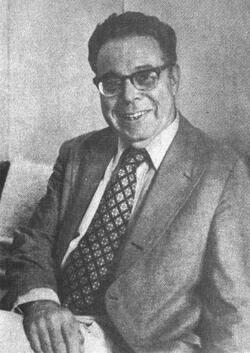The Generosity of Orthodoxy
In the first season of his podcast, “Revisionist History,” Malcolm Gladwell hosted an episode titled, “Generous Orthodoxy,” which opens with a quick definition:
That phrase, generous orthodoxy, comes from a theologian named Hans Frei. It’s an oxymoron, of course. To be orthodox is to be committed to a tradition. To be generous, as Frei defines it, is to be open to change. But Frei thought the best way to live our lives was to find the middle ground because orthodoxy without generosity leads to blindness and generosity without orthodoxy is shallow and empty.[1]
The phrase “generous orthodoxy” might have been Frei’s, but it isn’t quite right to suggest that he offered it as an oxymoron. It’s an understandable mistake, as Frei’s initial description of generous orthodoxy is framed as a middle path between two extremes within Christianity. But the oxymoron label is incorrect or, at best, a misrepresentation. Because Frei approaches orthodoxy not in terms of a preservationist posture to a static historical tradition, but in terms of Jesus. In answer to the question, “What is the essence of Christianity?” Frei writes, “the meaning of the Gospels is what one might term a ‘high Christology.’”[2]
Orthodoxy is not commitment to a tradition but commitment to Jesus, manifested in Christ-centered thought and practice, anchored in the plain sense of the scriptural narrative.
Orthodoxy, for Frei, is not commitment to a tradition but commitment to Jesus, manifested in Christ-centered thought and practice, anchored in the plain sense of the scriptural narrative.[3]
He is Alive
What is such thought and practice? In his first letter to the Corinthians, Paul writes: “When I came to you, brothers and sisters, I did not come proclaiming the mystery of God to you in lofty words or wisdom. For I decided to know nothing among you except Jesus Christ, and him crucified” (1 Cor 2:1-2). Who is Jesus and who are we in relation to him—these are the central questions of Christian orthodoxy, in Frei’s view.[4] And one of the basic, ineradicable features of who Jesus is as presented in the Gospels and celebrated in the church is the affirmation that he is alive:
Jesus defines life, he is life: How can he who constitutes the very definition of life be conceived of as the opposite of what he defines? To think him dead is the equivalent of not thinking of him at all.[5]
Anchored in scriptural narrative, the generosity of orthodoxy from Frei’s perspective isn’t an “openness to change” but an openness to the abundant meaning of the unique and unchanging identity of the living Jesus, a posture of living out the Christian faith that reflects something of the object of faith itself. To affirm that in Scripture God reveals himself in Jesus’ life, death on the cross, and resurrection as “the exact imprint of God’s very being, [who] sustains all things by his powerful word” (Hebrews 1:3), bringing the salvation of the world in vicarious identification with the guilty in their helplessness (Philippians 2:1-11), is to affirm the intrinsic generosity of Christian orthodoxy.[6]
God’s Generosity
So, as Miroslav Volf has observed, while we might interpret the phrase as an oxymoron, it is more nearly a tautology.[7] Because in Jesus God reveals himself to be generous, orthodox accounts of who Jesus is, how he relates to humanity, and who humanity is called to be in relation to him will be generous. From this perspective, the “generous” in generous orthodoxy is redundant.

The revelation of God’s generosity can be considered in several ways.[8] But the simplest and most obvious way of construing the generosity Jesus enacts and embodies is simply as the love of neighbor.
Faith a Pilgrimage
Approached in this way, one might say that even to describe it as a tautology misses something important in what the generous orthodoxy phrase is getting at. It points to the ever-present dynamic between the orthodoxy and the generosity of Christian faith – the ongoing discernment of what it means for us to love God and neighbors as Jesus loves us.
Generous orthodoxy describes not only who God is, but who we are called to be by virtue of who God is. Generous orthodoxy in this sense frames Christian faith as a pilgrimage, the journey of a Christian life “following Jesus at a distance.”[9] Because Jesus lives, Christian orthodoxy lives and is ongoing. It is ongoing not in respect to the content of Christian orthodoxy, but in its meaning: it has been given to us to know who Jesus is, not fully (whether in the sense of the documentation of his every waking minute, in the full breadth and depth of his interior life, or his Triune life), but adequately in the Gospels. We know, particularly in light of who Jesus is revealed to be in the Gospels’ Passion-Resurrection narratives, that God loves us and calls us to love God and each other as we are so loved.
Jesus says, “As the Father has loved me, so I have loved you; abide in my love” (John 15:9). But discerning what Jesus’ identity means in particular situations—as God’s beloved Son, the one in whose love we are to abide by loving God and neighbor—is a task that will proceed until history ends and creation is consummated.[10] As we enact Jesus’ identity in imitation (Matthew 10:25), and as we encounter the presence of Jesus’ identity in others (Matthew 25:31-46), we learn more about Jesus.[11] Such discernment won’t change who God reveals himself to be in Jesus, but it might deepen our understanding of who this God is and what He means for our lives today. When considered in relation to Jesus, orthodoxy and generosity are synonymous and mutually expanding, existing for those who would follow him not in a dialectical relationship, but in an unfolding, dynamic, and mutually-encouraging one.
Drew Collins ’07 B.A., ’10 M.Div. is an associate research scholar at the Yale Center for Faith & Culture at YDS. He co-teaches the Yale undergraduate course, “Life Worth Living,” and teaches “Christ & Being Human” at YDS. He has a Ph.D. from the University of Cambridge, where he focused on the theology of Hans Frei, Christian theology of religions, and the 20th century ecumenical movement. He is co-editor of The Joy of Humility: The Beginning and End of the Virtues (Baylor University Press, 2020) and author of the forthcoming Unique and Universal Christ: Refiguring the Theology of Religions (Baylor).
[2] Hans W. Frei, The Identity of Jesus Christ (Wipf & Stock, 1997). Internationally known theologian Hans Frei ’45 B.D., ’56 Ph.D. taught in Yale’s Department of Religious Studies from 1957 until his death in 1988. In his work on hermeneutics and Christology, most prominently in The Eclipse of Biblical Narrative, The Identity of Jesus Christ, and his posthumous Types of Christian Theology, Frei offered penetrating analyses of both so-called liberal and conservative theologies, charting a course for theology that remains influential today at Yale and beyond.
[3] Jason Springs, Toward a Generous Orthodoxy (Oxford University Press, 2010), p. 17.
[4] Frei, Identity, p. 187 ff.
[5] Frei, Identity, p. 180.
[6] Frei, Identity, p. 145.
[7] Miroslav Volf, “The Love of God, The Home of God,” Vimeo video, 58:38, posted by “St. Mellitus College,” July 2, 2019, https://vimeo.com/345669572.
[8] For example, beyond the formal generosity of Jesus’ ongoing existence or the particular generosity connected to his vicarious identification with the guilty on the cross, one might point to the incarnational and Trinitarian sense in which Christian orthodoxy is generous. Generosity conceived not simply as open-mindedness but as self-donation clearly echoes Paul’s description of Jesus’ kenosis (Philippians 2:7). “(T)he mode by which the eternal Word lives out his human life as Jesus of Nazareth,” and the procession of the Spirit from Father and Son, is an apt description of the dynamic of the mutual indwelling that characterizes God’s triune being. Trinitarian Christian orthodoxy contains a form of generosity at its heart.” See Ian McFarland, The Word Made Flesh (Westminster John Knox Press, 2019), p. 140.
[9] Gene Outka, “Following at a Distance: Ethics and the Identity of Jesus,” Scriptural Authority and Narrative Interpretation (Philadelphia: Fortress Press, 1987), pp. 149-53.
[10] McFarland, The Word Made Flesh, p. 199.
[11] Frei, Identity, p. 171.

